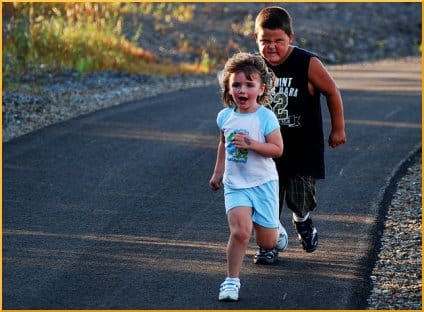
Last time, Childhood Obesity News looked at a study from the University of Leipzig showing that lower socioeconomic status is linked to overweight — more so than the lack of physical activity.
Dr. Candice Taylor Lucas, of the New York University School of Medicine and Bellevue Hospital Center, is lead author of a study released last year, whose press release says:
Depression is very common in low-income mothers and makes it more difficult to engage in beneficial parenting practices in general… Overall, these findings demonstrate that stressors prevalent in low-income households, such as depression, single parenthood and associated infant behavioral challenges, influence feeding practices likely to promote obesity.
Poor and depressed mothers will overfeed their babies. In particular, health care professionals are concerned about the habit of adding cereal to the formula bottles, which is known to increase the risk of excess weight gain. Depressed mother are said to be 15 times as likely to do this. But only 254 mother-infant pairs took part in the study, and they were mainly Hispanic, so maybe a certain amount of generalizing has been done from a relatively small sample.
It seems worthwhile to ask why moms in lower socioeconomic groups tend to fatten up their babies past the point consistent with optimal health. For some it’s a cultural imperative, a demonstration to the elders that one is a good mother. Even if that were not so, financially disadvantaged mothers also live in constant fear that the state will find reasons to take their children away. Plumpness is visible proof that a child is well-nourished and cared for.
What can prevent mothers from being so anxious, so stressed and depressed? Social safety net programs, says a University of Illinois researcher, Craig Gundersen, who teaches agricultural and consumer economics and studies the effects of food assistance initiatives such as the Supplemental Nutrition Assistance Program actually work out. A ScienceDaily report quotes Gundersen:
Energy-in, energy-out is important, but energy imbalance isn’t the only thing leading to overweight status among children. We also know that people have very different ways of responding to the same amount of food intake and exercise, and one of the factors that may influence how people react to eating and exercise is through the amount of stress they’re under.
Although there have been many different ways to reduce obesity, what we’ve found is that stress is a leading cause of obesity among children. So if there’s any way we can reduce stressors from a policy standpoint, that will also have the effect of reducing obesity.
Stress, of course, can be alleviated in a temporary and illusory way by compulsive eating, as so many obese and food-addicted people have learned to their dismay.
Your responses and feedback are welcome!
Source: “Low-Income Mothers May Overfeed Their Infants,” USNews.com, 04/28/12
Source: “Stronger Social Safety Net Leads to Decrease in Stress, Childhood Obesity,” ScienceDaily, 07/21/11
Image by ronnie44052 (Rona Proudfoot).

 FAQs and Media Requests:
FAQs and Media Requests: 











